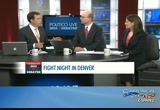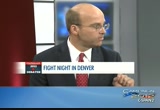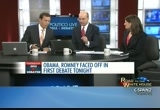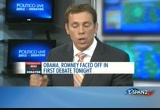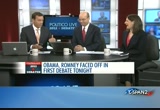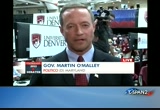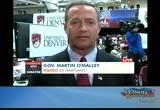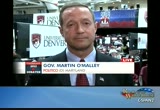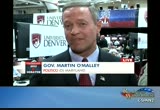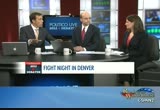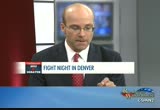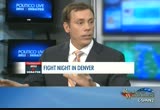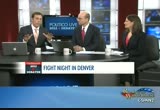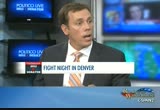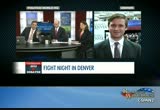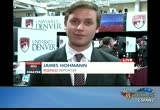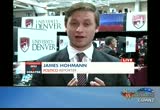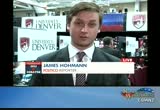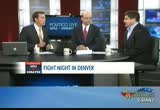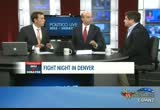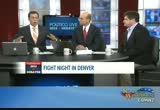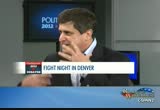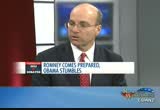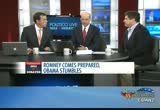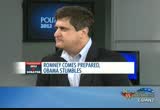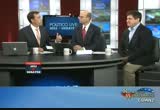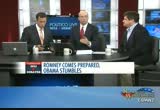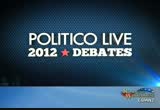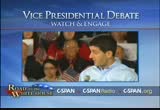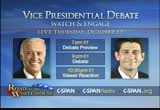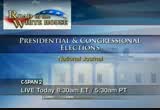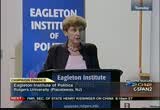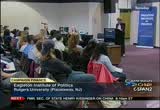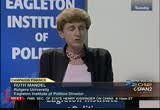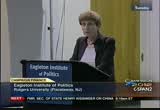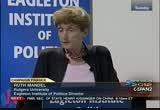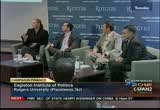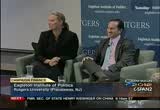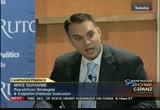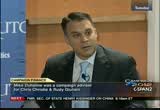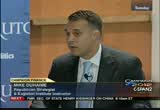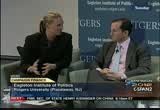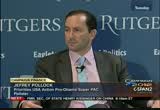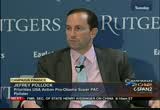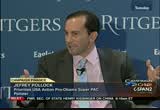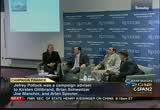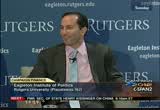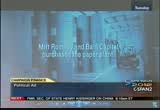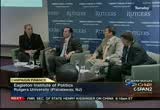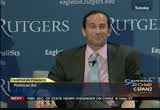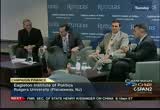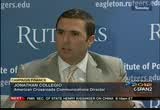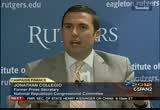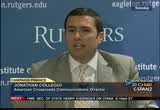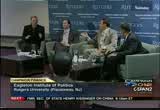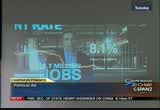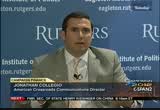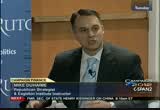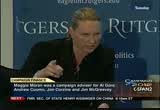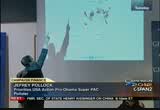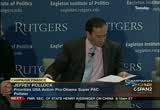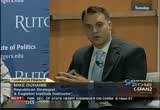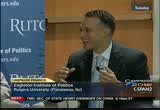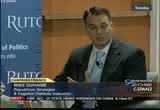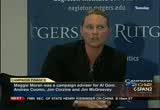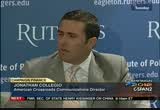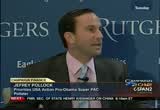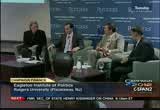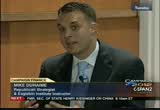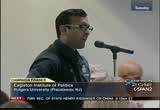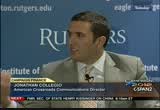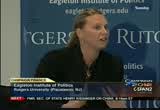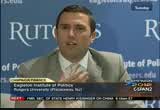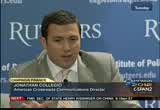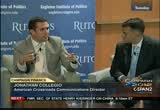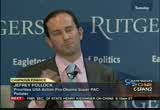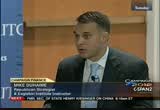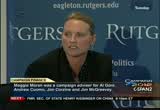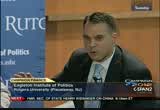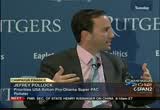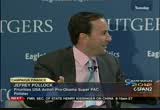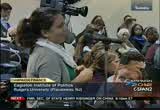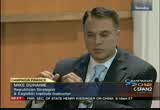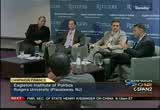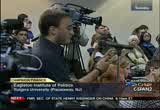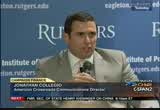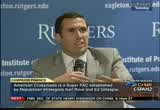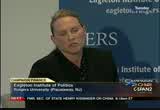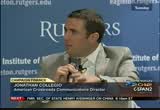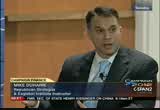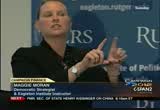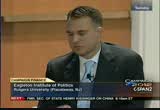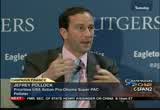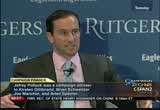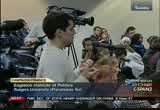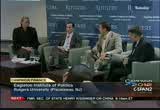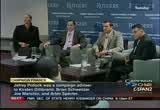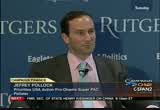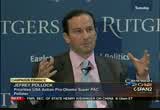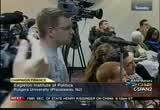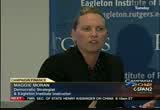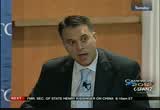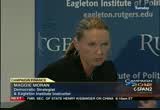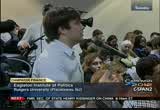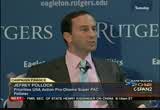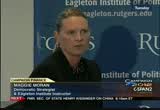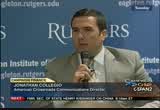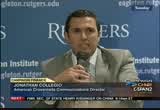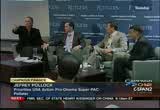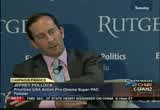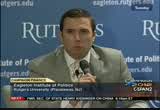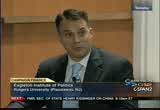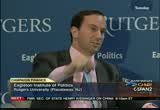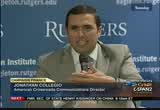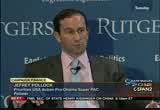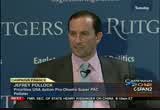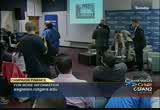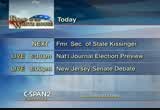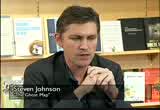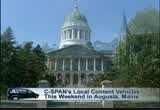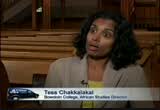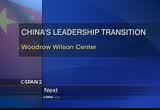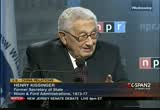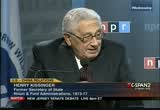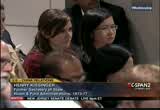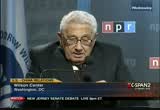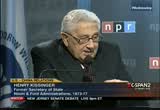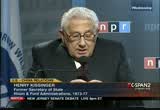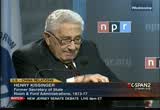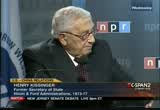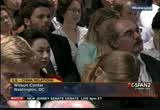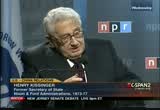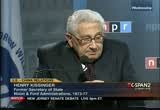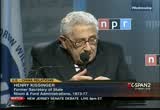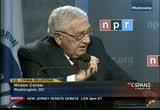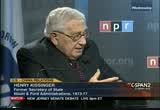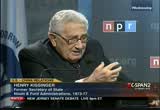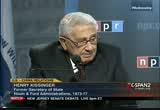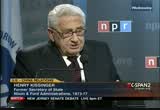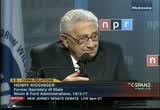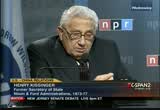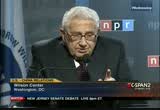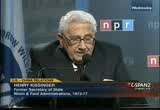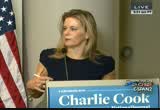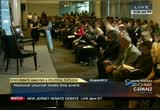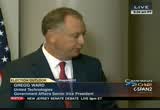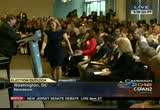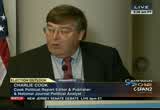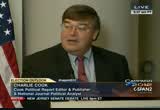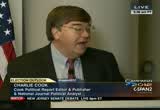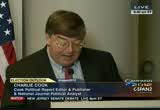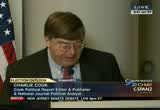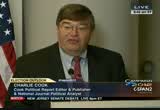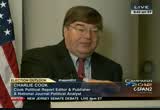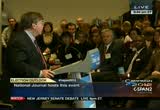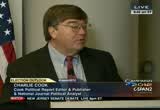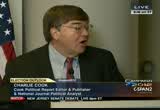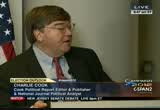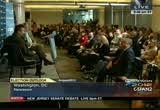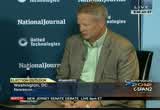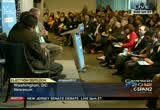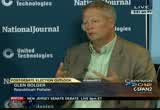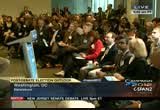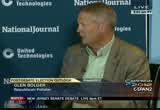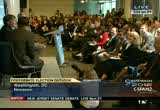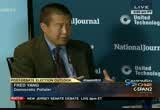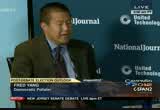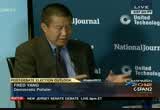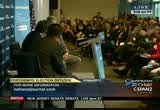tv Today in Washington CSPAN October 4, 2012 6:00am-9:00am EDT
6:59 am
7:00 am
3.7 million jobs. obama's spending drops $5000 deeper in debt and now we have fewer jobs than when he started. what obama promised versus what he delivered. >> what this ad does is it holds the president to account for a very big promise he made. when they were selling the stimulus, your talk about how bad the economy is today, the president had a plan to fix it. they spent $800 billion of all kinds of different things to try to fix the economy. they spend money. what we got was debt. we found that when you talk about in those terms, here's what the president sold to the american people. these are the results. not only did not create the jobs he promised, it created a lot of debt we have to pay off. that's kind of our messaging. we try to hold elected officials to account for the record and also for the promises they have made. that's why a lot of incumbents
7:01 am
don't like super pacs. >> we have an important note. one of the things we talk about is targeting. living here between new york and philadelphia media market you're not going to see any of these most likely. potentially pennsylvania has been a target state. neither campaign or the super pacs advertising in in sylvania. it's the most expensive market in the target states. i think it's also important to remember, there's a lot of money that is concentrated to a very small number of states and ultimately a small number of people as well. that's something i think is very important. a big part campaign finance reform and the unintended consequences. that's what my pet peeves is the unintended consequences sometimes as well intended legislation. we want to open up to questions. we will give maggie a chance to respond but i didn't want to become the moderator but somehow
7:02 am
that may happen. but we are going to open it up for question. we would love the students to take questions first. the microphones are there if you want to get yourself on c-span, wait, don't say hello to anybody you know but you can do people when it will run. now i will turn the floor over to maggie. >> just a couple afford. one of the things that fascinates me when folks discusses issue is the talk the role of unions and labor. what's interesting about organized labor is they've been under a series of roles for years, special under the federal department labor in those roles have gotten more and more strict. if you're a rank-and-file member of unique you have an opt out dues check off in order to agree to let your money, 5 cents per hour, to be used for political purposes. when i go to the store to buy a
7:03 am
soda, i didn't sign on to whatever companies selling me that so does political agenda. i didn't choose that sally company makes revenue and then takes that ribbon and is now putting it into massive amounts of it come into an agenda is corrupting the political process potentially with a massive influence of wealthy wealthy dollars coming from large-scale bulk hundrecorporation. unions can has been political money out of any of their accounts but they do have to report forward and report for it. you want to walk through some of those numbers? >> you put up the one chart and these are not my numbers. these are from the "washington post." take anything they want. i have open secrets but if you put up that picture, you can see the ad spending, come up. look up top.
7:04 am
these rights are tell you the amount of spending, ad spending, that's been done. american crossroads, 59. restore our future, 41, americans for prosperity, 36. those are the top three. all of those are republican. and you get the 22.7 for dnc, 21 for the rnc, mitt romney committee. four of those five are republican entities. and yes barack obama has a lot of money, too and i'm not trying to push, to blow past the. the obama campaign has had a commencement money. when you look at the super pacs it's very clear that republicans have dominated. restore our future has been $87 million. upon that was being of newt gingrich but still, or rick perry or whoever was the flavor of the week and republican primary. but $87 million, and crossroads
7:05 am
30 million overall. and after that club for growth, $12.3 million to massive amounts of money into cycle. and so i just think it is what it is but it's reality we're getting with. it's why we're here today to talk about and it's a very difficult thing for campaigns to deal with. >> you did say i think when looking at the practical matter of this campaign the president's campaign is outspending pretty significant governor romney's campaign on television but you're right, with the outside groups is actually, if you aggregate the president and the groups on the left and governor rod and groups on the right it is governor romney side as heavyweight on television but it's relatively close but it is an aggregate that the is on is on that site. that is an important part. this used to be the party committees, republican national committee and the democratic national committee used to be able to do this. as well intentioned as finance reform is, basically the
7:06 am
entities that are most accountable for the voters at the candidates themselves. they have to go out, put their faces in in adeimantus i i've authorized is. they're ultimately the people are voted on. a kind of next let out would be the party committees because of their control by the elected officials. they are held to account, the closest thing other than the candidates being held to account by the voters. what you saw is a figure that out in terms of the party committee site. they figure that out right away, and you have done this. this is the result of a large of people wanting to think that money has no place in politics and what they did is they ended up putting money outside. fisher spending by the candidates in the past, well before 2002, was basically closer to 50/50. one candidate would spend about half the money, another candidate would spend the other half.
7:07 am
[talking over each other] so you have this but then as you start in the backing of the party committees to an independent expenditure in ads which actually i think still is an unintended consequence of the state, they should be able to work with the candidate and campaign. you start squeezing them about a month is being spent by the candidates, and i have the outside groups. what's happening is rather than each candidate trying to get 50% of what's being said on the air, each candidate is now getting 20% of what's being spent on air. you could be getting down to 15%. it really is, it has taken, people are most important this process which other candidates, and made them less and less relevant and less and less advocates on their own behalf.
7:08 am
if we did anything else it would be malpractice on our side but this is in many ways kind of the outgrowth of campaign finance reform. >> if you're an average voter, tends be even if they will be contrasting or negative the candidate has to own a message of the ad. if, in fact, you have a large-scale asset to be don't know how it got funded, throwing up attack ask them how does the distinction between what could be accurate, what's not actor, what's motivating that ad, who's the person saying there should not be a millionaire's tax or should be? who's the special interests and how does the voter sift through it? one of the most amazing things that's happening them when you look at the president's number in the swing states he is doing well. for some reason that message is not coming through but it's not compelling. if you look at some the swing state that we thought would be remarkably close at this point
7:09 am
are really starting to trend towards obama in a way that every seems to think that unless these debates reset his presidential election, it's quite clear that the president actually headed towards creating an environment where on this map is a significant advantage. >> governor christie promised speedy this is right, met ron is going to be so exceptional tomorrow there'll be a seismic shift. >> let's watch. talk about it next week in class. >> the crossroads different venues also engage in more localized regions, states, congressional and senate. a bit about how you choose your priorities since you have a broader scope than is. >> that's a good question. the goal of american crossroads is to be president obama into electing a president but were also heavily invested in senate and house races. a lot of the other super pacs or not. we are focused on all of the
7:10 am
senate races are where you see a lot more of the advertising earlier on just because senate races, people figure, pay more attention earlier. will also engage in number of house races problems later. >> look, that's the other thing. crossroads place an outsized role in the senate races, and don't think that these two are not wind. i'm not suggesting it nefarious, but even if let's just say there's parity between the democrats and republicans in presidential advertising, the republican side, crossroads and others, our way of outspending on the senate races and house races. and those all have an impact because it's the infinite, how do people feel when there's millions of dollars in ad spending in the state of montana, for example, on the senate race, it affects the house race, it affects other races below it. and so that's one of, i don't
7:11 am
know this unintended consequences but it's certainly a consequence of super pacs spending like this. but when he campaigned, and i work for far more campaigns campaigns and independent expenditures, when we deal with campaigns what we always talk about is when his crossroads going to come up? when his crossroads going to be there? because we're not really half of our planning and half of our discussion is about what the outside entities are going to do, and what mike said which is right is we used to just plan on the other side, we used the kind of have okay, we're going to do, they're going to do. but now we are playing for so to multilevel chess deal which makes our jobs more -- >> and there are a number of them and more and more there are super pacs on the left not have cropped up in super races and their multiple super pacs on both sides spent not account the environmental groups.
7:12 am
>> right. >> the biggest outside spin and house races is the democratic -- >> majority, super pac. not today. you just said you guys haven't started. >> to date. >> i don't think that would be, at least in the senate sure, you guys have been -- >> the other thing that is important to realize is there are very specific rules that everybody has to abide by if you're involved in a super pac, and everybody on both sides take these rules very, very seriously. it really is. it is interesting to watch. there's a lot more players involved in this, but having to live but all these rules that make independent expenditures truly independent, something that's important for everybody to remember. all sides are trying to look at this. i remember after the 2004 election i appeared on a panel,
7:13 am
they lamented that the field organizing was done by the rnc on the public inside and by the outside groups on the democratic side and they could not legally communicate with the campaign and they were not able to do that in their mind. to simply have any questions? >> please try to keep your questions as concise as you can so everybody can get a chance. >> the citizens united case of corporate to bundle of these political campaigns -- >> corporations are people, didn't you hear? mitt romney said. the supreme court said. >> my question is, i'm interested in big international
7:14 am
corporations that are maybe station in the trendy. has there ever been international corporations have funded these particular super pacs and has there been like pro-nation, like has certain countries been fighting for a particular candidate like say, separate nation have a put to them shall -- particular interest for particular candidates to be elected in the u.s.? >> [inaudible] >> first i don't know that corporations would agree -- [inaudible] if you're looking super pac since a corporate entities there some money going into them but i don't know if there's much as you think. so i don't know the case that since you have quite the degree of a lot of people would think. [inaudible] the second thing is we don't take money from foreign entities. very, very play in the stated all over literature.
7:15 am
>> no money from foreign nationals. spent question right over here. >> i just had a quick question that we're talking about how it's changed a few a little bit, even some words about its corrupted the political field, but at same time it's created some jobs for you guys. so talking about that, a little more honest about that, how do you feel about, would you be in favor of getting rid of super pacs? if so, what would you favor in response or what would you take its place because the amazing part about campaign finance reform is it's always evolving. let's assume a new set of laws is past. as quickly as they are passed election was figure out how to get around them. it's remarkably to campaign finance is a constant evolving issue. i think there's got to be mechanism, i work for to, million of politicians and my life.
7:16 am
i believe there should be a mechanism for rank-and-file people should you be opposing some who so funny tempers a millionaire to be able to raise large amounts. i believe putting the money back have more accountability for the electorate and a much more integrity driven process an issue you're dreading to frame an election. sunday personally just. that's my from make money off these campaigns? absolutely. but from my perspective i think it's better for the country if we go back to that model. >> i don't know if i would necessary agree with that. look at what, i don't know if you saw the american crossroads add what super pacs actually to end with advertising does. a lot of people in here, remember the question in political science 101, should be elected representative do what he believes is right or what constituents because right? you could answer the question one way or the other. the important thing to take with them it is -- [inaudible] nobody
7:17 am
wants to run for office so they can -- a robot into the you what to be a candidate because you believe in something. whatever you want to do. nobody wants you to just pull the lever for what the constituents you to do. so all a super pac and would do is identify places where the elected representative has gone too far from his constituency, and then educate the electorate about how the elected representative is sideways with the public opinion and the people. so you take that crossroads add, we're running it in all the states talk about the president has had this tennis program. testing this thing was wildly unpopular, and all the ads is hold the president or another elected official to account for what they did. it can't change public opinion about the stimulus legislation that we can identify places
7:18 am
where an elected representative went sideways and let people know about. i don't know that i agree with the question that is necessary to bed. i think it brings to light a lot of things. >> i think on the accountability product, i think there should be full disclosure. i think if you allow that to float to the candidates it would allow challenges, other funding candidates and if you which is just wave a wand, if you're to get rid of limits and allow people to eventually contribute as much as they want as long as it's disclosed to the press and opponents convinced they can decide whether not that is having an influence -- and undue influence on the official. >> the other thing is the way candidates raise money. they raise money through the traditional packs, the corporate or union pacs that exists in washington, d.c. mostly to incumbents. we looked at traditional pac giving in 2010.
7:19 am
traditional packs which are mostly corporate, gave to democrats out of proportion 57% to democrats, 43% of republicans. mostly corporate tax giving to democrats that republicans and they're working with incumbents. so it makes it, it's almost like the game is very tilted against anybody who wants to try to crack into the process. that's what's difficult. and super pacs are not liked by incumbents because they can hold the office or to account. the incumbent doesn't like the. the traditional pacs are always going to go and give money to the incumbents spent by the hope would be, it's still perverse. i would still rather have the opponent pointing out those things in a super pac. i would rather choose the campaign that i set out in some
7:20 am
other entities. there some solutions. good or bad, that's one solution. the disclosure. certainly is one thing. there are multiple solutions but to me it is frustrating that the candidates voice has been muted. everything has been an impact of free media frankly on it. but on the senate race and the house races, just these two men, two ladies talk to one another and to find out between each other. and i think we probably would get a little more patient out of them and a little more contrast but it would be like here's what i think i'm here's what she thinks. >> that's a really good point about the presidential race. and opinion, but i think the advertising probably matters less in a presidential race than any of the race because people are watching the presidential race. when it gets down to u.s. senate races is very difficult for either candidate have enough money to spend. outside groups me -- in terms of
7:21 am
where they can spend their advertising dollars and it is, it has become much harder for candidates to get their voices heard without large dollars for advertising on the presidential race you meet the coverage of pretty. we don't see that in our state. even the governor's race really until the end you don't see a lot of candidate following. >> we have a lot of super pac independent activity in new jersey not on television because it's not affordable in the state to be on new york or ugly. there's a ton of field programs of mail programs conform programs, digital programs, predominately field as of late where you can really change outcomes and i think that happen and was evidenced by the race between congressman pascal and rosman and congressman pascal one on the basis of a remarkable field operation firefight of entities which just change the dynamics of the situation of that raise. and that wasn't even the
7:22 am
intention that it had a huge impact. so in new jersey i think the media markets, because are so prohibitive that other areas are being used. >> my question is do you believe that corporations should be counted as people or not? >> [inaudible] >> i think it's more of a legal question but i don't know that it even had, there are legal reasons why the count corporations as people in courts. it's beyond my expertise to even have an opinion. >> we are all under the same rules. the 47% of the people aren't even relevant. [laughter] >> that's true spent but if you count cooperation maybe he can add in a couple of points back. >> since you brought up 47%, because i haven't heard governor romney say, this is a guy on a 47%, this is a guy who gives
7:23 am
four plus million dollars of his own money to charity last year. listen, millions and millions of dollars. it's preposterously someone gets millions and those of dollars doesn't care about people spent we didn't say. mitt romney said. i hear what you're saying but the quote is two things and one assist to the public. what it says is that mitt romney you see on a stage in a debate or the national convention or in a tv ad is saying one thing but the mitt romney behind closed doors when things there's no press is saying something entirely different. >> it depends on the day. sometimes mitt romney says one thing and -- the 47%, the important point improves your point, which is there haven't been, they did an add on 47% thing, but you've seen small media in terms of amount of dollars spent, the amount of voters nationwide to know about
7:24 am
this because of the earned media coverage in a presidential race, it's remarkable. they did a whole bunch of surveys that tested whether people had heard about the 47% in the swing states. the numbers were astronomically high. that's the thing. and i do think that the comment was emblematic of what people had already built in in the feelings it any uncertainty it was mitt romney isn't like me. he doesn't get me, he doesn't get the middle-class. and that one comment encapsulated it all. >> he was talking like a political strategist and not as a presidential candidate. >> that was a lame excuse. 40 some% of the people are not voting for me, i know that because 40 some% of people are not voting for barack obama, that would be fine but that's not what he said. he went much further than that. and the sort of simple dismissal of them were all fighting over
7:25 am
10%, we've all said that. that's not what he said. he said the people don't pay taxes, they are developing and many of those -- >> he didn't say that either. you're taking liberties. >> next question if we can. thank you very much. >> in the interest of full disclosure i am a grad student, a member of one of those so i just thought i should say that. [talking over each other] >> i'm surrounded by people who kind of have the same ideological bent as me and i just don't understand, the reason, i've been following these reasonable 80 laws and you are saying that there's a linkage there was a super pacs because your sing people like the koch brothers funding the super pacs but also these initiatives to get these voter id laws passed. so my question is kind of
7:26 am
twofold. is this pretty blatant i mean this is what republicans are saying, attempt at voter disenfranchisement and explicit strategy of the republican that is emerging as something were going to see in future elections? and just to challenge it, how do you justify this? >> i will take the first crack at this. i don't know anybody would've said that, the republicans there, no republican -- >> im. they are saying they do not want certain people to vote. they are saying this. and the don't understand how you can justify this. >> i don't know that's what they're saying. okay, answer your question. outdid my response. here's what happens. i've seen first in voter fraud. it is probably not as rampant as a lot of people would have you believe, just like some republicans trying to disenfranchise people is not as rapid as which are trying to see. what you have here is you have a
7:27 am
tug between both sides impose such thing in the site is doing something wrong. i've witnessed it. i've watched people casting illegal votes and physically tried to stop. that doesn't mean every democrat is a crook. if you pretend it's not happening you're only kidding yourself. so you have, the pushing of sight to try to stop people from cheating. you can argue whether that goes too far. it is a very difficult time between both sides in terms of how do you stop that. >> well, i love mike duhaime but that's absurd. if you want to stop fraud, to the. stopped fund. -- stop fraud. that's pretty embarrassing. there's a whole series of tactics that are completely outrageous and it's against everything against the country.
7:28 am
>> that is not the intent. spent the intent is -- the intent is to stop people, the intent is to stop multiple people from voting, stopped dead people from voting. [talking over each other] >> in the city of brotherly love which you are from, the city of philadelphia where everything is run by the city and the genuine -- general election become the democratic people and what used to be the case that polling location were literally in people's garages you have no accountability. at one party control and so i can build and nobody watching the election. so you can complain that someone is trying and maybe staring too much into this, but what you had is no accountability and a number of places in this country and you can say republicans are wrong for doing this, there's a lot wrong on that site. what you're saying is not that that accountability when -- [talking over each other] >> both sides are right.
7:29 am
there is some fraud. stay my site is more right. [laughter] >> there's certainly the tactics that they're choosing seem -- the notion of a modified poll tax what to do some of this is it's not the right way to go. in fact, pennsylvania law, there was a stay on it today in pennsylvania. so it's the wrong tactic and i hope that the change they way. because, frankly, none of us think voter suppression is the way to go. it's not the way to win elections. i am positive that johnson doesn't spend time thing about how they can suppress voters. we certainly don't, it just isn't worth it frankly, but that solution, the solution of the id is absolutely the wrong one. >> i'd like to thank you all for coming here. i know you have a busy schedule. i'd like to redo a quote from eric schultz on this issue. he said in the aftermath of the citizens united decision in unprecedented amounts of
7:30 am
campaign spending, often by groups that won't disclose their donors. so my question is, how important is anonymity? because it seems to me like if your argument is money is free speech, then we should hold people accountable for what they say. if the ceo of pepsi were to give $1 million to mitt romney tomorrow, i wouldn't buy pepsi for the rest of the year. so how are you going to hold it accountable? >> just one year? [laughter] >> he's not that committed. you've got to work on it. >> other pepsi products might be okay. just pepsi itself. >> not in new york city if they're really large. >> but what i'm saying is how can we hold these people accountable when we do not know what they are saying? >> long story short, this election cycle, there are a lot of different groups that organize differently under tax laws.
7:31 am
the super pacs and independent expenditure 527 committees in all of those reported in the seat and reportedly monthly or quarterly and disclose their donors. they are also nonprofit organizations, a whole host of them, that organize under to the parts of the tax code, organized as 501(c)(4), and issue advocacy organization. they are private organizations that are not required to disclose their members or donors. this is a type of tax law that is protected, going back to the 1950s, it's been argued the whole logic behind it, and it's not done by the right, not done by the left. it's done but all type of these 501(c)(4) organizations. environmental groups organized the same as some of the center-right groups are what they don't disclose their donors. with the irs, basically they're political organization and if your nonprofit organization you are allowed to spend some of your resources on political activity. can't be a majority of what you do, but it can be some of what you do.
7:32 am
that's what's happening with those 501(c)(4) organizations is there following the laws that govern nonprofit groups. >> and there's an investigation already buy the attorney general eric schneiderman, into some of us. and sort of whether this kind of spin and whether it's all kosher frankly. the kind of money that's being spent, but johnson described it perfectly well, and it's too. there's something remarkable though, republicans for ever and ever was about disclose, disclose disclose. and now we can get the disclose act passed in the senate thanks to the republicans, in the house at all. those are the kind of things i think a frustrating but i think big picture it would be better for all of us. >> is that the first place what you're looking for bipartisanship of the last four years? that was the one place where president obama would reach across the aisle, great. >> i think you answered your own question, right?
7:33 am
why do you do anything anonymous? you don't want to be caught. you don't want someone to know what you are doing, right? there can be a variety of reasons for that but it takes away a remarkable amount of accountability because he don't know who is financing something that you are watching and feeling you have no sense of where it's coming from, why it's there, with her motives are, what's actually happening behind the curtain. >> a lot of the questions that come from that angle, if you will come at the same people who advocate the most for finance campaign reform. that's what i mean about the turn 11, it's going to put the money away from the candidates in some way, the are some of the groups after that live under different rules and they also have to abide by difficult in terms of how they communicate. >> just going back, i believe that the amount the candidates can raise some individuals, is it the same as a was in 1978?
7:34 am
>> it's up a little. >> okay, but back in the '70s people were able to give, like $2000 for candidates. now they can get $2400. so over a lifetime is still hasn't been very much. >> next. >> [inaudible] do you think we're seeing the end of publicly financed campaigns? and what reform do you see might happen any of campaign finance in the next few years? >> i don't think it is going to end. 's the do you think it will realistically go back to public finance campaigned? >> why would? >> in the city i live -- [talking over each other] >> one of the untold stories in the 2008 race, senator mccain
7:35 am
was dramatically outspent and every target state. the decision for the obama campaign and mccain to stay inside was not a good decision in terms of to what extent at the end of it because he was about the outspent the to i've nobody will ever do that again. unless it changes dramatically in terms of the amount. >> you have to take the public matched funds and i didn't. >> in new jersey we have matching funds. we've had a couple of pilot pro can on the legislative level. on the gubernatorial level there is matching funds in new jersey that if you raise it certain threshold, $350,000, the state will match you two for one. if you raise that amount, basically you can have $1 million. it makes a candidate if you can reach kind of a certain threshold of citizens in terms of the building to demonstrate you have enough support, you can become viable very quick. he saw in the gubernatorial primary in 2009 and even in the
7:36 am
christie general election in 2009. christie adds ran around $11 million which is a lot more than most campaigns get in new jersey on the u.s. senate race, very really get that i. that gets to be enough to get your message out. you really need to hit about a minute of $10 million to get your message out. in new jersey the public financing essentially gives candidates the ability to get to that threshold level. you can opt out. it remains to be seen how it goes going for but we don't have on the legislative level. >> it had a remarkably positive impact on the campaign because the candidate doesn't have to spend -- i can tell you how much time candidates spend fundraising. it is massacred i remember frank lautenberg retired, he is since come back from his sabbatical but when he first, the reason why he retired was because he
7:37 am
would've had to have raised $12 million. when you look at his schedule for the year, he would spend on the 60% of his professional time outside of the floor of the u.s. senate fund raising at cocktail parties. for him he just got to the point where he just, it was just so remarkably daunting to him, so in his mind inappropriate that he wouldn't do it. so for candidate christy or google talk candidates, it's terrific of a public matched to have that kind of level of engagement with the candidate is out with the voters much more often instead fundraising with just a small subset of people all the time. >> you see that on the presidential bubble now. you see them spending much more time and on target states because there is this ongoing race, you can't fall behind. you've got after 1000 plus points in that market and you have to have the same in dayton and jacksonville. you have to be there. it is this constant pull between to have enough money on tv versus going out and shaking hands with people and getting media coverage.
7:38 am
>> next. thank you. >> my question is for crossroads right wing -- >> wow, we don't know what you're thinking. >> you mentioned the foundation of some of the right wing backs, specifically a response to a lot of union money on the left. i'm curious if you still consider you guys at a disadvantage, all the allegedly rampant union money coming in from the left. would you say the playing field has been leveled now that the money has trickled down to congressional races? and also to the left you think we will see in the future any of the lefty pacs coming in and funding more congressional and senate races? you think that we will see some ads specifically target ads attacking people like todd akin or chris smith for the radical views, or do you think this is on the left side something specific to preserve for the presidential election?
7:39 am
>> i would chris smith and todd akin in separate categories going forward. >> did we hear about that allegation? >> we won't know what the unions has been until after they have filed their reporting, whenever the file. i do know from "the associated press" a few months ago reported begins with and somewhat enamored of $400 billion in 2012. they spend 400, 450 million in 2008. i would suspect it will be up in that range but in terms of what they actually spend after all that's happened and i don't think we'll know that until the middle of next year. >> you are letting that guy off chi. that's 300, koch brothers and one other guy. i don't think it's going to be even, i think you'll be very clear, to answer your second question, there is a lot of activity on the left in terms of super pacs in these senate races, in these house races. there's a group called majority
7:40 am
pac, senate majority pac and house majority pac. and those entities are actively funding their own set of advertisements in all those places. and certainly in the todd akin's race in missouri senate race, that's their problem they have to deal with. but claire mccaskill with look-alike is going to be a very tough election, and todd akin opened his mouth. so there's plenty of activity on the left side in that race and many other races. well, there's also activity in the sort of center. one of the races that the two of us are against each other, i worked for a guy in indiana named joe donnelly. indiana is supposed to be a rebel convoy -- republican race, and a tea party guy came and beat the great dick lugar, the great senator for so long, and beat him in a primary. and for the last two months that race has been tied. crossroads just came in with a huge lie, but the democratic side has a lot of money in as
7:41 am
well. if you look and you go to indiana, and i said montana before, if you go to montana he cannot watch tv without seeing nonstop political advertising the candidates are the teeny piece now. so we have plenty of firm on our side, i promise you. >> thanks. i want to ask this question for jonathan. well, thanks for coming. i would like, i think i don't hear both agree that democracy, we have so much money and few, so little people, do you think that that undermines democracy? because me as a soldier, i volunteer whole year. $1 million, that makes more, more than one all i can do for work for campaign. and how is that, how do you
7:42 am
think that disenfranchises what we are as america, democracy? because i think that's for america spent i think of to look at what the alternative is, right? the alternative is saying that it is censoring. so i don't know the joint to be put into a situation we have a government is determined by someone who wants to put his ideas up on television can't do that. that's one of the things. with campaign finance is that what you said about tamoxifen it's the worst form of government other than all the other forms of government after. that campaign finance may not look perfect but when you look ago turned as i do know they are very good. i don't know it's very good to have department of justice you can't run television ads. i think you should be able to do. i think that's a first a minute right and i think that once you start moving into that constitutional right i think that's when it starts getting ugly. >> there's money in elections forever. lots of money.
7:43 am
went back on his weekend. go back to george washington and there are stories about how george washington tonight before there were tales of buying from and beer and the voice of grog right now the day of election day. talk about how they got out to vote. there's been money and things in politics was long as we now. so i don't think either side of us necessary things that the money itself, having money and doing the way we needed to campaigns is necessarily evil. it's about disclosure. it's about how these things are fun. so for me, if shelton wants to put up an ad, yes. the supreme court free speech, put up an epic but at least stand behind. tell us who you are, tell us what you're saying. i think that's probably a different world than what we are living in today. i'm in one of these super pac pacs. but we are dealing with a because when i going to disarm, as mike said, we are not going to be unilaterally disarmed but
7:44 am
there has to be better ways than this. >> thank you very much for your question. >> hello. thank you for coming. i have a second question. both democratic and republican politicians have publicly spoken out against existence of pacs and super pacs saying that they heard and corrupt our democratic system. what do you believe on this issue? >> what do you believe? army, ideally the supreme court erred and that the outgrowth of all this not necessarily great, and i think there has to be a better way. i think that the first thing that you for talk about, i mentioned before, the disclose act, which has been bandied about certainly for the democratic side, no republican support, in terms of having disclosure, far more disclosure so we would know what's going on. and i think we would be better off. our democracy is strong, let's
7:45 am
be clear. we are okay. we are not dying based on this, but social question that we still have some tweeting to do. don't forget what maggie said. every time we've.com in 2004, 2002, it was like ie it was all about the 527s for 2004. there was something in 2006. there's always a new iteration. that's at the thing, don't ignore the. something new will come around. >> we agree, we got involved for a reason but i have tremendous faith in the voters. a chairman's faith in voters in montana. with a great history in a country of doing that, being able to figure it out but it is the job of both sides who want to advocate, to advocate hard. but i have great faith that voters can figure it out. >> you're talking hundreds of minutes of dollars on thousands
7:46 am
of initiatives on top of the. so much money spent on something that is evolving you might have no clue or care about. and the airwaves are even more -- thankfully california's more airwaves to deal with but largely funded by individual or large groups of trying to get some point across on both sides. >> it's great to have all you folks here. unions in the united states are a dying thing really. is something like 12% of the private workforce. their last bastion of is the public sector, so with the loss of their membership, their influence obviously with wayne. how long the see the unions remain a potent political force and are they even still that strong nowadays when you have scott brown -- sorry, scott walker in wisconsin able to defeated them a couple of times. in ohio they did take some hits. curious as to hear your view.
7:47 am
>> on the future i can't really say. i can just go back to 2010 where three of the top five spending outside groups were unions. that was reported in "the wall street journal" and i think there's a whole slew of research to back out of. maybe not on television but in other ways the unions spend money. at this point they're very strong stomach look, like any other -- >> look like any other sector, they would have a problem, and i think that's the case for everything, for everybody, or a company. to have to think about new and unique ways of getting at the heart of what they care about. there's a whole history whether it's civil rights or women's rights for workers rights what people remember what unions were created in the first place. most of the world today has no recollection of why that happen. they don't know that god work 18 hours, you got paid a number that couldn't even let you live in a town in which you work.
7:48 am
people don't understand what the database came from to the have to be an evolution and innovation within that movement. icy unions today, the smarter ones, doing all kinds of interesting things. to incorporate a fair work where they take their own money and great economic development. a lot of what i saw during the recession where banks warned lenin were taking their own pension conservation, their own investment managers and seeking out economic development opportunities. that's smart. that's look at how to get economic development activity, get my folks work. by do something to incentivize the economy. i think there's a lot of compelling unions that are innovating and thinking differently about it. i think to underestimate the the kind of political promise unions have today in america, it wouldn't be smart. they are pretty powerful. >> i which is the one thing to watch go forward politically a special in new jersey and northeast, a much more unionized state, so unions have different
7:49 am
arson differences but i think one of the things that's important to watch, you saw in wisconsin and places is a growing between public sector union workforce which is growing in the trade the private sector. i think there are different views on politics and different views on public policy coming from both sides. i think we're at an early stage on it but i think it's something to watch as we go forward in terms of different kind of political objectives of public sector and private sector which different objectives and i think ultimately we will see a bit diverse in the. >> people love talking about this, the division between public and private sector changes. if you believe in them your trade unionists. whether your public or private to public and private sector unions have always had a different agenda. how can you maintain a quality level of service and what you pay for the service of the private sector unions have a different obligation and north dakota were.
7:50 am
so there's always been a different agenda in terms of how this would focus on the main public policy question. behind that though there's a sort of their unanimous view on things like collective bargaining and a series of tenants. >> thank you very much. >> again, thank you all for coming and talking to us but my question is, you guys talk before the emergence of superb acting of the candidates kind of influence on what they say and how much of what's being said is their influence. has kind of diminished. and i was wondering how much on the super pac level is it wait and see candidate does with their campaign, or do you strike first with the issues, and in the future to see more more of the super pacs setting the issues in an election cycle, or to cut it wait-and-see -- a lot of issues that are talked about come from the media.
7:51 am
i'm wanting that the candidates themselves -- >> look, the super pac work, so that a permit because i think what you type it is kind of these independent expenditures. and it really depends on the race. what both sides are armed with lots of good pollsters, for example, who are looking at numbers -- [inaudible] >> we're trying to figure out whether, what's happening in the race. and if we are in a race and we are doing well, but let's take indiana, for example, a perfect example where joe donnelly and have a primary, comes out strong position, republicans have a primary. at the end of the primary the republican can is left with no money because he spent all his money attacking dick lugar. and so we are up, although polls show us ahead. we are doing great and so they got to sit there and say okay, we know that murdoch is sitting
7:52 am
there with no money. do we jump in and try to help? we know is going to raise money over the next four or six or eight weeks, and so should we fill that time? that's the kind of decision that all the independent expenditures go through all the time. sometimes they are. i think in general we love to take hints from the candidates, because even though we are not ordinary, which were not, we do not coordinate our activities, it's always better than those where taking hits to cesar with the campaign would like because we don't really want to do something that they don't like because they are the campaign, they know best what they are doing. but know that sometimes we do. we are the ones who jump first. >> and traditionally to be candid, traditionally its contrasting negative, traditionally which are going to see is i think the obama campaign is quite fair about this in terms of hands come right to which is not going to wait long to defy mitt romney. from their perspective in terms
7:53 am
of the content they felt they didn't do a good job defining mitt romney from the outset, that with economic climate everything else that was going on, this is immature difficult situation. what jeff and his team pulled off, as i think really sort of ingrained in average voter's mind, a certain perception of mitt romney, and to think that they did a really fine job at it and i think as part of what the romney campaign is trying to reposition itself and figure out how to move forward on. >> the obama campaign did a massive job, too before we got there. spent a lot more money. i actually think, i wonder what percentage do you think of the crossroads, the gps ads, the federal nonpresidential do you think will be comparative, to have some element of positive to it, or to date? >> that's a very, very good question. that's an excellent question and it kind of tangential. because outsiders can't courtney, i think it's interesting for an outside groups can't coordinate with candidates and party committees.
7:54 am
for television ads, the candidate can really start in our and. we could go to a mitt romney event and film for mitt romney fully but we be getting the same thing that the news crews get. we can't shoot an ad of mitt romney talking to the camera about why he would be the best president. so what kind of does, the anti-coordination lost almost all of the outside groups advertising negative. because at that point you know that were not coordinating with barack obama to run a negative ad about him. but if we run to a positive ad about mitt romney, and people would start to question, which is the footage from? it's investing in 2010 crossroads ran an ad supported of now senator rob portman in the ohio senate race, we have pulled the video footage from a publicly available place you do, so when a so forth, and immediately with a couple of hours of the ad going on the air the ohio democratic party filed
7:55 am
a complaint alleging recorded with camping to get the footage. that was enough of a headache that we haven't run a positive absence. nobody wants seven ongoing litigation within the fec over something silly. the campaign laws have created a situation is as low contrast advertising because of the prohibitions. >> committees do, select the democratic in national campaign, their independent arm. they are doing a bunch of comparative ads because while they don't coordinate, each of the candidates are throwing their information on the party website to republicans, democrats, same exact thing. there's been more from the committees, and i should think it may be even more over the closing weeks, particularly in these swing states why think the voters are so overwhelmed with the negative of the presidential that there may be a bit more of a contrast because i think that even in the independent groups are saying you know what? a sort of need a boost. we need to say something nice about these people speak we will
7:56 am
take this question, the last question. we want to get our speakers some closing remarks. >> a non-coordination lost, i'm curious if you guys could further elaborate on the complexities that go into making these ads. because i could see that there's a very dogged a balance between completing meeting the candidate or maybe just think something negative, what is the criteria that you guys specifically choose to create these ads? are they a part of a campaign fund within the super pacs, or do you just look at the president or governor romney and take it from there? >> it's a very researched-based thing. the whole process. campaigns are very researched-based. so both sides, we are armed with data, we want to test various things and one of people persuaded by the other persuaded by this message or that message,
7:57 am
social security, education, health care. what are the messages that will move people, and then we develop about, database and some of those message. was where in the throes of the campaign of course we have to be able to call an audible. you have to be able to say okay, we were going to do this, and the other side is doing x., and so made we've got to go there. and so in the beginning best laid plans are there and then they inevitably go all over the place. or choose what is often about our jobs, truthfully, everything about my job i love. i wake up everyday, i do politics for a living, and i have a blast. we love what we do. all of us have been in this love the game, level we're doing, not electing people we believe them. and what makes it nice is it's never the same. spent i also wouldn't ever underestimate the amount of research that goes into any
7:58 am
political ad by professional organization. the smaller group, you never know what they're advertising on. like a big group like crosses, there are literally three or four verifications behind every assertion that we make. you never want to get an ad pulled from the television show that you don't want to sing sing this is false, going to pull this. table. crossroads, i don't think we've had an ad pulled up one of his wife we have never had an ample this because we've had a team of researchers who are literally making certain that every assertion is full of putting it is different those of verification to make sure that the ad is 100% factual. >> in terms of how the cannabis outside groups work or people who used to run campaigns, or basically if you're doing a good job running an outside group, you can figure out if i was one of the campaign will be really helpful to see on tv tomorrow. so the most responsible i think i'm the most effective asset groups are generally run by people with significant camping
7:59 am
experience one step an outside group can really screw things up if they run the outside ad, and they can be helpful if they run the right kind of ad. >> going with what jonathan said just so people understand, if the ad can be proven to be factual and accurate, the tv stations can pull them off there. if you challenge it and someone deems it is false, it can be pulled off the air. it is almost impossible to do that to a candidate. so a candidate has the freedom to say almost whatever they want. but we are much more conscious on independent expenditure side, i mean campaigns are, too, but we spent a lot of time on the backend research, making sure the facts are right. because we don't want those ads back. not only did we spend money on both sides be out what the message should be but one thing to great that i can depend on a tiebreak we may even test the ads, online testing. so there's lots of different ways we try to figure out do these things work or not. both sides are armed with this
8:00 am
vast mass of information to try to get it is very small number of voters we're talking to speak we all have a couple of minutes left but i thought if you guys wanted to leave this audience with one last thought about sort of the role that you think these super pacs are playing in this particular presidential race, and, of course, this will be no surprise, we would love you to handicap the congress and the presidential race. >> thank you guys so much. it's been a great event. .. >> where the candidate or elected official has done
8:01 am
something that is sideways with what their constituents think. i think it provides more information to the political process. you have to think about what the alternatives are, but you could have a situation where you could have taxpayer-funded ads, you could have people not liking that taxes are funding negative ads, you could end up with all kinds of censorship. it's always critical to look at the alternatives before you start looking at how we need to change the system. >> thank you. >> obamacare, the most perverse -- >> he owns it. >> -- bastardization of a policy plan done by the right wing where we have all the groups jonathan's talking about, a $716 trillion -- billion? what is it? cut to medicare, which isn't true. every republican that he's supporting also supports the exact same thing because they are accounted for in the ryan budget minus $200 million more,
8:02 am
so $916 billion. these are the things that i think are problematic in terms of how the policy debate, and i think that the, um, the super pacs only make it worse because you have individuals who have personal, um, opinions that they're trying to foist upon people. and i think we'd be better off with the candidates, we just would be. i'm happy to be part of a super pac, i'm happy to defend barack obama because he's the next and best president of the united states, and that's financial. but do i wish this didn't have to be? yeah, i do. and i think experiencing -- in connecticut we have public financing campaigns, and you know what? they work just fine. and the voters while they may say they're not that happy with taxpayer-funded campaigns, you know, things have gone pretty smoothly in a lot of these places that have public finance, so i just think the rhetoric
8:03 am
doesn't. match the reality at the end of the day. more likely i think we'll see changes to the laws and, um, and then the next incarnation of super, super, super pacs. >> well, we want that thank you very much for coming and let you know that mike and i are running a cam concern campaign in new jersey this year to informs $750 million in higher education facilities which we haven't done in new jersey for almost a quarter of a century. i have to do one last plug for a good reason. so thank you very much. [applause] [inaudible conversations]
8:04 am
[inaudible conversations] >> see the only vice presidential debate next thursday, october 11th, live on c-span, c-span radio and online at c-span.org. watch and engage. coming up today on c-span2, former secretary of state henry kissinger on how the leadership change in china will effect relations with the u.s. live at 8:30, national journal editor charlie cook leads a forum on the 2012 elections. also, live tonight at 8 eastern, the debate between new jersey senator bob menendez and his republican challenger, state
8:05 am
senator joe carillos. >> tonight, new jersey senator bob menendez faces his republican challenger in the first of three debates at montclair state university. we'll bring you live coverage courtesy of nj tv in englewood starting at 8:30 eastern here on c-span2. on sunday more senate debate coverage from connecticut where republican linda mcmahon and chris murphy debate to replace joe leishman. see it live -- joe lieberman. see it sunday on c-span. >> this is the first -- this is my fifth book, but the first i've written where there's an actual sustained storyline running through it. it's a true story of about, basically, ten days in london in 1854. and it's a story of an incredibly terrifying outbreak that took place during this period, an outbreak of cholera. and, in fact, the first half of
8:06 am
the book is really quite, um, sobering and frightening in some way, um, as this outbreak just devastates this neighborhood in the western edge of soho. but it also turns into being, actually, i think a much more optimistic story because the events of this little stretch of time turn out to be central to solving the riddle of where the cholera was coming from and then, ultimately, setting up a series of kind of public health initiatives and other strategies for basically eliminating cholera as a threat from london and from other cities around the world. >> stephen johnson is our guest sunday taking your calls, e-mails and tweets on "in depth." the science writer and author of eight books will look at science history, popular culture and computer networking and politics live at noon eastern on booktv on c-span2.
8:07 am
>> this is the first parish church in brunswick, maine, and its significance to the story of uncle tom's cabin is that in many ways the story began here. it's here in this pew, pew number 23, that harriet beecher stowe, by her account, saw a vision of uncle tom being whipped to death. now, uncle tom, as you probably know, is the title character, the hero of her 1852 novel, "uncle tom's cabin." uncle tom's cabin was written very much as a protest novel to the fugitive slave law which mandated in 1850 that anyone in the north, particularly new england where the abolitionists lived, if anyone in the north were to aid or abet a fugitive slave, they themselves would be imprisoned or fined for breaking the law.
8:08 am
and this was the bill that was seen as a kind of compromise between the north and south to avoid war. so that was part of what the novel was trying to do was to say, listen, i'm a person, harriet beecher stowe, and i'm against slavery as was most of new england. and if -- it's my right to help a slave who finds him or herself in our border. we have the right to do that. we are not a slave state, and we should be allowed to practice our laws as we see fit. >> more about harriet beecher stowe this weekend as booktv, american history tv and c-span's local content vehicles look behind the scenes at the history of and literary life of augusta, maine. saturday at noon eastern on booktv on c-span2 and sunday at 5 p.m. on american history tv on c-span3. >> the wilson center hosted a forum wednesday on the upcoming
8:09 am
leadership change in china. next, part of the event featuring former secretary of state henry kissinger looking at what the 18th national congress of china means for u.s./china relations. this is 35 minutes. >> somebody who by accident was assigned to conduct the first mission to china. largely because president nixon felt that if he went through regular channels, he'd be overwhelmed with a lot of technical details on subjects he considered were not central to the immediate challenge, and he could be sure i couldn't
8:10 am
overwhelm him with details. [laughter] on that subject. so when i first came to china, i had an experience which is perhaps unique in this sense; every visitor to china would have killed for the privilege of meeting chairman mao. i was terrified of having to do it for the reason that i knew that president nixon wanted to be the first policymaker who met mao. and i knew my life wouldn't be worth living having done the first photograph of an american with chairman measuring ao. chairman mao. chairman mao had given instructions that if i requested a meeting with him, i should be
8:11 am
taken to him immediately. i went to enormous contortions not to request a meeting. [laughter] and so i achieved that goal of my visit. i met, of course, each generation of chinese leader, and each of them reflected the mission and the conditions of its period. mao was a revolutionary, a prophet who was consumed by the objectives he had set and who
8:12 am
recognized no obstacles in terms of feasibility. the standard ritualistic language of american diplomacy didn't interest him. he, what brought me to china in his mind was that china was threatened, that he had to find a possibility of having the dissident barbarians, the more dissident barbarians deal with the more closed-in barbarians. in other words, have the united states balance the soviet union. that was his strategic objective. which he pursued with great strategic skill. i had the good fortune that my
8:13 am
opposite number was -- [inaudible] who was prime minister, had served as prime minister for decades and was to serve for the first about -- really until he was forced out of office four years after the, the opening. he was also, of course, of the revolutionary generation, but in his, but, with -- but where mao was with instrumental and directly to the subject and who, for example, when president ford said to him i always believe
8:14 am
that you can disagree, i always say when you disagree, you don't have to be disagreeable -- which, of course, makes no sense in chinese -- [laughter] so mao said, why would you say that? [laughter] he was the most skillful diplomat that i encountered, a man of extraordinary ability to intuit the intangibles of a situation. and, of course, he was involved in many of the actions that mao ordered, involved in enormous human suffering.
8:15 am
so the judgment i express here are those that i experienced personally. when we first started talking to the chinese, we had one great advantage. there were only important subjects to talk about. there were no trivial subjects on the table. there was nothing that needed to be settled, there was no trade. even five years after the opening, the trade with china was less than the trade with honduras. about three or four hundred million dollars. and one of the reasons was that whe mao was alive that even though he wanted the u.s. as a strategic partner, he did not want china to be dependent on
8:16 am
the rest of the world. and he insisted on maintaining the purity of communist doctrine. the conversation with, the first conversation has been published, and it reads like two professors of political science speculating in the abstract about the nature of international politics. and you may wonder why this was. because, in fact, the only thing worth talking about was, at that point, whether we could establish enough confidence between the two of us to risk the adventure that opening to china represented for both sides
8:17 am
for the chinese from the ideological point of view, for us from a domestic political point of view. and even though the subject of the visit of president nixon to china was the reason why i came, it did not -- neither side mentioned it until about 12 hours before we had to leave. i mentioned it only to say that a rule of foreign policy or diplomacy that i like to follow and that i believe should be followed is get your objectives straight before you start haggling about details. now, we had no choice. now, every generation since then
8:18 am
then -- [inaudible] was a great reformer, and i cannot think of any other country where you can so definitely can say that the evolution that we have seen in the last 30 years depended on the vision of one man. as in the case of -- [inaudible] i certainly met no other chinese who had the vision and the courage to move china into the international system and to engage in reform and in instituting a market system. the next leader came into office in the aftermath of tiananmen, and he'd spent the better part of his 12 years in the office
8:19 am
restoring china to the international system and making china part of a genuinely globalized system. hu jintao is the third leader that actually had to operate a china as part of a globalized system. with each generation the style of leadership has become less personal. that is, that's no -- mao was treated reverentially, almost as a deity. appointments with mao were never scheduled largely because of his health, but you were suddenly called out of a meeting and taken to mao without advance warning or without being told ahead of time. that you were going to see him
8:20 am
at all. and this was true of presidents. after missing the first meeting, i had the opportunity to meet him five more times -- five times more. then so hu jintao and his generation had the mission of calming the system, operating china within the international system, working in the globalized structure. and now we have a new generation of leaders. and they have their own challenges. for one thing, many of them -- several of them, including the
8:21 am
vice president who will soon be president -- are the sons of victims of the cultural revolution. their fathers were the victims, and victims meant that they were close to mao, were purged, disgraced and sent to the countryside. one of the attributes of mao was, however, that some of the victims were pulled out of the countryside when mao needed them. and the sense of nationalism of the chinese is so great that when mao became concerned about the soviet threat, he pulled four maoists whom he had
8:22 am
disgraced out of the countryside, brought them to beijing and said write me a paper on what the challenges are that we are, that we're faying. facing. so these are, some of them are the sons, and, therefore -- and they are governing together with some people who may have been in the red guards who were the instruments of the revolution. but both the red guards and victims when mao was through with the red guards, he sent them to the countryside too. so many have had the common experience of this. which creates one perspective on the period but also gives them a sense of having been hardened and of having experience of the
8:23 am
trials that one can imagine and who are, there therefore, as tys different because they have seen both the challenges of the rule and some of the suffering and have come out of it now in leadership positions. they're facing a set of huge problems. the transformation over the next ten years they have to move 400 million people from the countryside into the cities. and, which, of course, is a huge technical problem of infrastructure and economy. but even more than that they know, as one must know, that
8:24 am
they will lose some of the values of the countryside and that new values will be formed. now, what is the role of the party? what is the role of confucianism in forming these values? i think that's an unsettled issue that will occupy china for the next ten years. and the younger generation is a generation that has two attributes. one, they are increasingly one-child families, from one-child families. so tre is the already strong chinese obligation to one family to do well. it's magnified when all members
8:25 am
of family concentrate on one person. but it also picks that -- prevents or it obliterates some of the smoother edges that have made chinese society so attractive. and also the younger generation is one, the first one in hundreds of years, that has never experienced disaster. so that is, i must say some of these observations i learned from chinese leaders. i mention all of this to indicate that to deal with china is a, in many respects, a
8:26 am
fundamental problem of american foreign policy right now. and the difficulty is that our history and chinese histories are totally different. we have been secure through most of our history. we were not conscious of the impact of foreign societies on us. china has always, the chinese state has always been surrounded by, by a multiplicity of states, so the management of barbarians has been a principal necessity of chinese foreign policy. we have dealt with problems on a short-term, pragmatic basis because that's how foreign policy impinged on us. the chinese have always -- at least have learned -- to take a
8:27 am
long, strategic view. because one cannot decide the outcome of any one issue unless you look in many it in a longer term. but these two societies with all their different approaches now have to deal with each other and have to deal with each other in a evolving situation. now, historians say china is now a rising country, and we are a status quo country, so it's similar to germany and england, and that led to war and, therefore, the likelihood is that something like that might occur again. but the first thing, remember, china is not a rising country. china is a country that is returning to what it believes it
8:28 am
has always been, namely the center of asian affairs. but it's inevitable that a rising china will impinge on the united states. but there are a number of things we need to keep in mind with respect to that. one, even the country between germany and england was not inevitable. and you can trace many misjudgments that were made that produced a conflict that was not inherent in this situation. but be that as it may with respect to germany and england, we know that one of the
8:29 am
leaders -- we know that none of the leaders who started world war i would have done so had they known what the world would look like four years later when the war was concluded. they could let themselves be threatened into conflict on the basis of considerations that were trivial in terms of the tragedy that they brought about. so, therefore, i think the conflict, a conflict between china and the united states would be a disaster for both countries, and it would be with impossible to describe what a victory would, would look like. and it requires on both sides patience and understanding above
8:30 am
all that they are trying -- above all of the goal they are trying to reach. in each country there are domestic pressures that emphasize these agreements that arise. we see that in our political campaign in which both candidates are using language about china which i think is extremely deplorable. and you see it in the chinese literature from their strategic centers in which their strategic analysts are pushing a very nationalistic, a very nationalistic line. and, indeed, as traditional communist ideology diminishes, there is the prospect that nationalism becomes a substitute for it. many of the issues that arides are vestiges of a, of a past
8:31 am
that we need to overcome. the so-called dotted line in the south china sea was done by some chinese emperor who had never heard of laws at sea because the concept didn't exist 300 years ago. so the issue of the islands when there are hundreds of islands requires, in my view -- >> just a couple of minutes left in this program. you can see it in its entirety at c-span.org. we are going live now to the newseum this morning after last night's presidential debate. the national journal is hosting a discussion with republican pollster glen bolger and democratic pollster fred yang to look at the debate from last night. >> before we get started, a few items to give you a sense of what's coming. charlie will be up in a moment,
8:32 am
and he will give us his take on last night's debate and then also give us, i'm sure, some very colorful insight on what we can expect between now and november and possible outcomes for november. and then he'll be joined by two guests, glen bolger and frederick yang, who will join him to also offer their perspectives on the debate and also the upcoming elections. we're grateful to all of our participants this morning. they are going to take questions from you all so, please, think about what you would like to ask. will be having microphones go around, and you can ask questions. we also invite you to join the conversation via twitter, it's hashtag president charlie cook. finally, so we can have an uninterrupted discussion, if you wouldn't mind silencing your cell phones, it would help us immensely. and we're able to gather this morning thanks to the generosity, underwriting support of united technologies, also known as utc. it's a very diversified company
8:33 am
comprised of several well known brands. they also have utc climate controls and security, b and utc aerospace which is as of recently now includes goodrich. utc has been a wonderful partner with national journal. this is our final charlie cook event this year. they also partner with us on the congressional connection poll which we conduct while congress is in session to get a sense of what's going on outside of washington and bring that news and information here, and it is national journal daily readers who can be informed via utc and the congressional connection poll there as well. i just want to say thank you to gregg ward and the entire team at utc for partnering with us not only on the carly cook events -- charlie cook events, but on the poll. gregg ward is senior vice president of global government recommendations, and that means he leads all of the federal, state government affairs activity for utc as well as all their activities in that area, in china, russia and in the
8:34 am
e.u.. he's very well respected and very well liked. please, welcome gregg ward. [applause] >> oops. >> sorry. >> thank you for that introduction. charlie just wanted to know what victoria was smoking with sump a nice introduction of me, for goodness sakes. welcome, something must have happened last night. i think it's probably the nats coming in first place. [applause] anyway, this is going to be a great session. we've had this long affiliation with the national journal family of companies as well as personally with carr -- charlie. it's always a great event. this is an exciting morning after the debate. looks like we may have a presidential race here, 33 days to go, so i know everybody's looking forward to hearing from charlie, as am i. so with that, victoria, i'm going to hand it back over to
8:35 am
you. thank you all very much for being here. back to victoria. [applause] >> i think all of you know charlie cook, that's why you're here. for over 13 years, charlie has been providing his insights and analysis to our readers in national journal magazine and also in our daily publication. he and his team put together some of the best political reports and analysis in town, and they are read and valued by both sides of the political aisle. and as a time when news and information on political campaigns has become so polarized, charlie remains one of the most respected analysts to everybody in the country, providing a balanced and fair and often very humorous take on the ultimate sport of politics. charlie has been called the best political handicapper in the nation by "the new york times", and bob schieffer called the cook report the bible of the political community. many of us just think he walks on water. please welcome charlie cook. [applause] >> i was just, boy, if i could
8:36 am
walk on water, it must be pretty thick ice. [laughter] anyway, thank you all for coming. there was just too much -- i was thinking, if i'm one of the most respected, boy, that's a low bar in this tournament. [laughter] anyway, thank you very much. and gregg and i have been friend for, i don't know, somewhere over 25 years, probably close to 30, and this relationship with united technologies has been great. boy, this room, i mean, we've got a -- you know, you guys are in prince william county, and they're in prince georges county. [laughter] kind of look at the span. but anyway, thank you all for coming out. and, um, this is just a quick reaction because i want to get, i want to get to glen and fred because they are just two of the very, very best pollsters on this. their firms are sort of both kind of the nordstroms on their respected sides of the aisle, you know, just very, very large
8:37 am
and enormously high quality and incredibly well regarded and longtime, good friends. and so i want to, you know, have plenty of time with those guys. but just some quick reaction to what happened last night. and, unfortunately, i had to do a column that i had to hand in yesterday morning, you know, before the debate, and it's not coming out til friday, although i just got an e-mail from my editor, charlie green, who was suggesting tweaking it a little bit now after yesterday. so i'm not sure what they're going to end up doing with it. but the point i tried to make is, unfortunately, everybody tries to make everything binary. a race is too close to call, or it's over. there's nothing in between. and going into this debate, there really was an in-between situation where clearly president obama was ahead, and
8:38 am
it was something that in the swing states was probably more durable than in the national numbers and where governor romney desperately needed to shake this race up. something had to change the trajectory in this election and that it needed to be something very, very, very substantial. and so here we are now with something, a momentous event, and it was in the realm of debates. this is certainly, um, much more decisive, i think, than pretty much any other debate i think that any of us here can remember. i thought governor romney did a fabulous job on both a relative basis, in other words, comparing mitt romney with mitt romney performances that we usually see, boy, he was fabulous. and on a nominal basis by, in other words, any standard, he did very, very, very well.
8:39 am
and i think it's true, i think it's true to say that president obama is a superior orator, and i think mitt romney is a better debater. and, but -- and that romney, you know, we saw something that we hadn't been seeing in a long time, and it occurred to me that this reminded me more of the mitt romney i met in 1994 when he was running for the senate and came by and met with me and stu rothenberg and was just incredibly impressive and analytical and fact driven, you know, very pragmatic. this was that guy, not so much the person who had kind of been pretending to be an i'd log for the last -- i'd log for the last few years. obama seemed to be like a team sitting on a lead, i mean, where -- i wouldn't have said smug at all, i would have just said somebody who didn't seem to be terribly hungry for it and
8:40 am
that, um, i think -- i mean, i don't think there's any question went you look at some of the, you know, and i'm not really big in these instant polls after. i mean, i don't particularly care for them. but on the cnn opinion research corporation, you know, who did the best job, obama 25, romney 67. you know, who did better than expected, obama did better than expected 21%, worse than expected, 61. who did -- romney, 82% said romney did better than expected, 10% said they taught he did worse than -- thought he did worse than they expected. my guess is that that 10% were partisans. [laughter] democracy corps' stan greenberg, you know, romney has a good night but no evidence of changing the game. well, you know, i agree with him completely on the first, that
8:41 am
romney had a good night, and, you know, i think we'll have to see a minute about before -- see a couple of days whether it changes the game. you know, walmart sponsored their walmart moms focus groups with momentum analysis, a democratic polling firm and alex brady, one of glen's partners at public opinion strategies together. you know, suggested that amongst a lot of these walmart moms it was a win for romney -- you know, the people in the groups were divided between a win for romney or a tie and that, on the other hand, or it said they were disappointed with the president's performance, they do not believe he made the case for how another four years would be different or better and that -- but made the point that neither one of these guys really connected with voters on a personal level. but clearly romney did, i think romney did a superior job of debating it. and so there are a lot of -- you know, we'll be seeing a lot of
8:42 am
reviews over the next few days, but i think the key thing for us to watch is no question romney won the debate. the question is, how much does this change things. and i think in terms of national polls, no question, he's going to get a few points out of this. but the harder points and the more relevant points is, number one, you know, does he move ohio, and does he move these swing voters in these swing states because that's what's really relevant here. and i have no idea because, i mean, my view has come to be over the last few weeks that the -- you show me an undecided voter if a swing state like, say, ohio, and they've been bombard by ads since june -- bombarded by ads since june. and that the undecideds there were a lot smaller than nationally, you know, four or five points, something like that. and i had sort of concluded that, well, you know, if you're in ohio and you're still
8:43 am
undecided, that you may never decide. [laughter] and you're probably not going to vote. and, you know, there may be something wrong with you anyway. i mean, if you're not -- [laughter] you know? so, and i'm not being dismissive that this isn't or can't change them, but the thing about it is, um, we should be careful about imposing as people, everybody in this room or everybody that's watching this on c-span or voice of america, they're all going to be very, very attentive people. and we're watching, and we're paying a lot of attention to this, and we just probably need to be a little careful about how some pretty passive people who don't like politics, who don't like politicians, who are very cynical and skeptical and sour, whether their reactions are going to be exactly the same as ours. but i think this is certainly a consequential event. and i think without any, um, without any hesitation at all had this gone the other way, had
8:44 am
mitt romney not done well, i think this would have been game, set, match. i think the thing is republicans were starting to get really nervous, and you were -- i think you were on the verge of seeing a lot of money getting retasked over for, you know, republicans hang on to the house for absolute sure, you know, and make a desperate push to get every possible senate seat under control because, you know, this romney thing's not going to happen. that was what was about to happen had romney turned in a poor performance. and so not only did he escape that, but he actually turned in an extremely strong one, and the president was clearly flat. and so the question is just sort of how much does this move in ohio, in virginia, in florida, in colorado, in these swing states? and, you know, we're going to have a great discussion, and you're going to hear from two of
8:45 am
the smartest people in the business, and, and -- but, you know, i think we need to probably, you know, just, you know, we could talk about it, we can discuss this, but um, you know, sort of look at the polls. let's see, tonight's thursday night, friday night, saturday night, start looking at polls sunday, monday, tuesday, you know, when you get full samples in all after the debate, after people have had the conversations in the supermarket aisles or over the coffee maker at the office or the backyard fence and see where this is. but clearly, you know, clearly, this is a game-changing event. but how much does it change? you know, swing states are what matters. and so this -- i think we're going to have a lot of fun, you know, just 100 words or less. i don't think, i don't think even yesterday before the debate, in our view, the house was not in play.
8:46 am
it was -- democrats were going to get, you know, somewhere between -- democrats needed a 25-seat gain to take a majority in the house. it was going to be somewhere between a wash and democrats losing, republicans picking up about ten seats. but there was no evidence whatsoever that this was heading towards 15 or 20 or 25 seats particularly when you consider the democrats because they've got about ten of their own seats that they're probably going to lose, they probably had to gross 35 to net 25, and it didn't look that bad. and today for republicans, it sure as hell doesn't look like that, you know, now in the aftermath of that debate. the senate, i'll just make one prediction. um, i think there is a very, very fair chance that on, say, noon on the wednesday the day after the election we may not know who's going to be the majority in the u.s. senate. because we're looking at about
8:47 am
ten toss-up races in -- and a lot of these are one-point races, two-point races. and my colleague, editor jennifer duffy at the cook political report, you know, pointed out when this class of senate seats were last up in 2006, that we had three states, three senate races -- montana, missouri, virginia -- 4.8 million people voted total in those three states, and those three state senate races and the majority status of the u.s. senate were decided by 66,600 votes out of 4.8 million. i mean, it was just sort of hanging by a thread, and that's how close it was and, quite frankly, i think there are five, six races, seven races that could be decided by, you know, pick a number, 100,000, 200,000 votes total nationwide that's controlling not only the senate,
8:48 am
but, you know, by several-seat margin one way or another. so there is just an enormous amount of volatility, you know, in the senate picture. and, you know, we'll see how it plays out. all right. why don't, glen, you and -- we're just going to jump up there, right? glen and fred, why don't you join me, and we're going to have fun. what i'm going to do is ask them a handful of questions, and then we're going to open up to the audience and let, um, and let you guys, let you guys ask questions and have a great porn. wow, bolger, you're on my left. that's awesome. [laughter] have the republican on my left. anyway, thank you guys for joining us because you guys, i know you're incredibly busy. let's see, fred, how many races are you working on right now? >> one at a time. [laughter]
8:49 am
>> ballpark. >> 15-20. >> okay. your firm's set up a little differently -- >> a lot. >> yeah, yeah, yeah. so these guys, these guys are seeing an enormous amount of data every week, and, well, let's not put fred on the spot. it was a bad -- it was not a good night. just quickly, what was your reaction to last night, and then we'll sort of launch into what it means. yes. >> well, first of all, as a yankees fan, a nats fan and a romney fan, it was a pretty good night. [laughter] pretty happy about that. and also, charlie, thanks for having fred and i. these are always fun to do. thanks to national journal and utc as well for having us today. i will say this to utc, i'm a huge fan of your jet engines, particularly when they work, so that's good. as much as i fly.
8:50 am
[laughter] yes, i'm still here, so that's a good sign. look, i think the two factors from last night are, one is, how much did mitt romney help his image, how much did he raise his favorables. because the bigger gap was not so much in the vote, that was, you know, we've seen a number of polls showing two to three points, it was in the fave about of the two candidates -- favorability of the two candidates. and i think romney came across to people as somebody who was more genuine than they had realized and as somebody who also they could see, okay, this guy could step into to oval office and have no problems doing that. ..
8:51 am
and unless they are really sickd staying up and watching the post-debate discussion. and heck i didn't even do that. i had to get up early. so, the question is the undecideds, the undecideds in this campaign, the first decision they make is do i want to vote for barack obama. he is the incumbent, the guy in charge for the last four years, and -- however there is something they have been concerned about with mitt romney which is why they are so undecided and you know i think the undecideds, which in a poll, actually i shouldn't say, 10 states i did two weeks ago
8:52 am
there was 6% of the swing states, 6% of the voters were undecided. that is a pretty significant amount and it sounds like a small number -- number. did that 60% look at romney last night and say boy this is somebody i feel a lot better about than i did going into this debate? i have to think that for those, and some weren't paying attention and some more but those paying attention the answer has to be yes. so i think you are going to see a bump in the polls for romney. i don't think you can tell from any polling done last night. i certainly believe that 67% said that, believe that romney won the debate. that by the way is a stunning number. usually the debates, our side thinks our guy won and there side thinks their guy won and it comes out about even in the wash so it was pretty decisive. >> real quickly glen, explained to a group of people and i doubt
8:53 am
if there is an undecided voter in this room -- [laughter] what to undecided voters look like? who are they? >> they look like the kind of people who tell the waiter to come back at the restaurant because they haven't made up their mind on what they are having for dinner. [laughter] and when you look at undecided voters, what is interesting this time generally undecided voters tend to be more younger women then anything else. in this case what i am seeing is an even division between men and women. there tend to be more in dependence. they are either somewhat conservative and not very conservative somewhat conservative to moderate but what is interesting is only 18% of the undecided voters in the swing states say the country is going in the right direction. 70% say it's off on the wrong track. that's much more negative than the country as a whole. so that is again why i believe that romney is poised to pick up some of them after this debate.
8:54 am
i will point this out too which is anybody who thinks the next debate is going to be the same as this one i think they are making a mistake. obviously obama is going to say let's throw that playbook out and try something different. >> you know fred, the debate was over and i thought wow, romney did pretty good. the president seemed pretty flat. been watching the post-debate and then watching some of it this morning, the romney performance went from here to here in the analysis and so, as someone who were to not push back a little bit, obviously romney did well but pushed back push back a little bit on, but keep in mind x. >> well, that is how the
8:55 am
president did. >> come on, glen. you are a nice guy. don't do that. >> i again i echo glen's and the national general -- journal for this event and all of you. i have done this a while and i think len and i would agree, charlie is someone that everyone trusts because he plays it straight down the line and it is great to be here with you. i have to be on the reality. [laughter] okay, i like what glen said. i think the issue for romney going into this was likability. but i don't think governor romney has had a long time to show a likability and i don't think he says like me because i am a nice person.
8:56 am
i think you show likability and connection by what he did last night which is a single-minded focus on what his strength is and what the concern of the country is so i think he did his job. i think you know, for all of us in this room, who probably are not undecided, i think the campaign you know probably kicked off i don't know -- 2009 but i mean for a lot of us who were consumers of news and followers of politics, the conventions probably -- okay, the campaign. for those undecided voters in ohio and other places and i know it's weird to say with all the ads they are watching -- let me back it up. there are a lot of ads that are playing. doesn't mean that people are watching all of them all at the time. i think for the average person out there the campaign really started last night, and we have a long time left to go still.
8:57 am
and and look, i think what mitt romney did what he had to do. he made this a much more competitive general election. i think president obama you know, i don't think he did as badly as the pundits are saying this morning. you know, i think the next debates, he will probably have a different demeanor. i think the debate last night was much more important obviously to mitt romney then to barack obama. i don't now how much this really changes the landscape because look, this race is very competitive. if you look at the battleground states, sure, depending on the polls president obama is winning and all of them but the margins are pretty close, and i think the other thing that the debates could do for democrats and the
8:58 am
president and also for the voters is you know, for our sides too is signaled the game is on and i think you will see much more enthusiasm. people talk about the enthusiasm gap. hart research does the polling for nbc news and "the wall street journal" are go for example with one group. >> so you are the conspiracy -- if hugh are the conspiratorial of the left-wing polling. >> so, barack obama is ahead with latinos but the crush in the poll was their enthusiasm was less than 2008 so i think that is another aspect of last night. >> glen, you know my thinking has been while it was mathematically possible for romney to get the 270 electoral votes without ohio, michigan,
8:59 am
pennsylvania, that was like a three or four cushion shot pool. is ohio really what we should be looking at more out more than anything else? >> that is a really good question charlie because yes, certainly much easier for mitt romney to win the presidency if he wins ohio. there is a reason no republican has ever won the presidency without winning ohio. i entered this election cycle believing that there were now three key states and instead of just florida and ohio and i would add virginia to that list and kind if of you know key states. if they are at the top, the next half level down is north carolina. but, look, clearly governor romney is stronger in florida and virginia. those are very competitive states right now. ohioan someplace where
140 Views
IN COLLECTIONS
CSPAN2 Television Archive
Television Archive  Television Archive News Search Service
Television Archive News Search Service 
Uploaded by TV Archive on

 Live Music Archive
Live Music Archive Librivox Free Audio
Librivox Free Audio Metropolitan Museum
Metropolitan Museum Cleveland Museum of Art
Cleveland Museum of Art Internet Arcade
Internet Arcade Console Living Room
Console Living Room Open Library
Open Library American Libraries
American Libraries TV News
TV News Understanding 9/11
Understanding 9/11